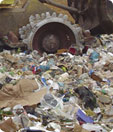Waste to Energy
 |
Waste-to-energy or energy-from-waste is the process of creating energy in the form of electricity or heat from the incineration or processing of organic waste material. Most waste-to-energy processes produce energy directly through combustion, or produce a combustible fuel commodity, such as methane, methanol, ethanol or synthetic fuels. The most common technology implemented for waste-to-energy processes is incineration. Organic waste material is processed through a gassifier to produce renewable energy. Other technologies implemented include scientific dumpsite closure, biomethanation, Gasification and RDF (refuse derived fuel). Tatva has engineered cutting-edge technology to produce energy from waste. Its commitment to the environment is evidenced by the production and use of its own energy. In this manner the Company offsets its greenhouse gas emissions and earns carbon credits. |
 |
Biomethanation plant at Ankleshwar
Operated by Tatva this special plant treats 5 MT of kitchen waste a day and through a process known as biomethanation generates bio-gas in quantities of 200 m3/day. This is used to fuel the plant’s incinerator. The sludge produced as a by product is used as manure. Renewable Energy Project in Mumbai
Tatva, in collaboration with a leading Spanish waste management Company, has been engaged to execute a waste management facility using biomethanation technology at a central suburb in Mumbai. It is a BOOT project for a period of 25 years. The existing dumpsite receives high quantities of organic waste from local markets (vegetable and Fisheries waste), hotels and restaurants, to the tune of 500 TPD, which is then to be processed through biomethanation for generating power. Other Subsidiary Projects
Tatva has signed a licensing agreement with a Japanese waste management major, for gasification technology for treating MSW and biomedical waste and subsequently generating power. |
SolidWasteManagement
Solid waste can broadly be classified into two categories.
Water Supply Management
Throughout the developing world, the provision of water supply ...
Wastewater Management
Urban water supply and sanitation are important basic needs ...
